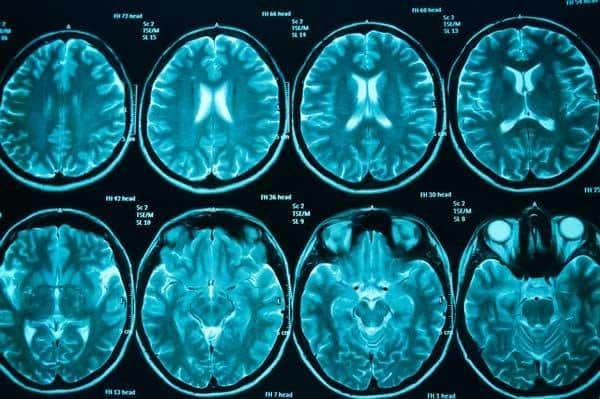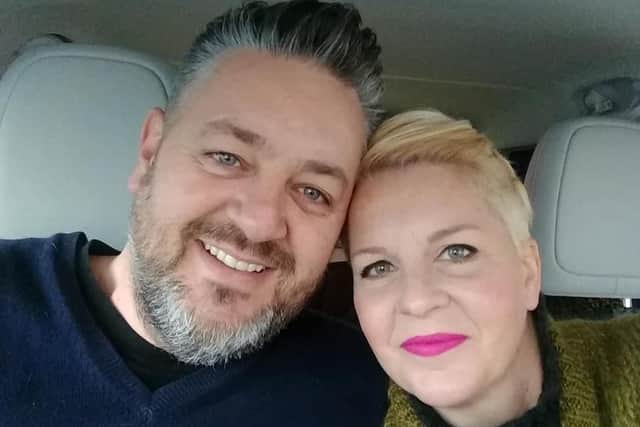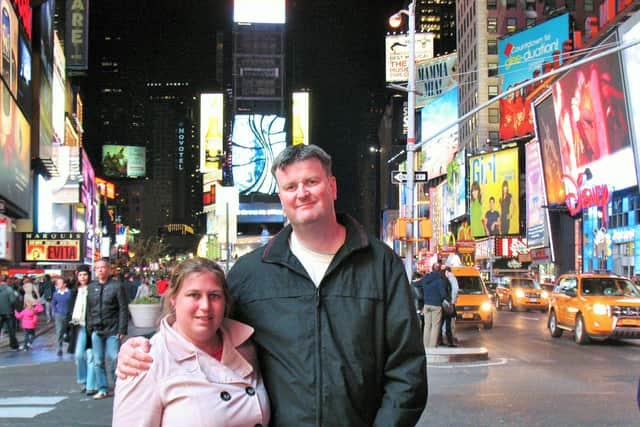Know the signs and symptoms of brain tumours
and live on Freeview channel 276
The Brain Tumour Chairty says that 33 people are diagnosed with a tumour every day.
The symptoms can include headaches, changes in vision, seizures, loss of taste and smell, tiredness, nausea and dizziness, while brain tumours are relatively rare, it’s still important to recognise the signs.
Advertisement
Hide AdAdvertisement
Hide AdAnna Kane, 49, had been having headaches for several years, and they had gradually got worse to the point that she had to take painkillers almost every day just to cope with the demands of her everyday life.


The Lewes resident saw her GP and the headaches were put down to migraines, so Anna was given medication for them, which did help.
However, in November 2021, Anna looked out of her bedroom window and had a visual hallucination that werewolves were walking towards her and her husband, Des.
Anna went to A&E at The Royal Sussex County Hospital, was checked over and then sent home. Over the next couple of weeks and after various scans, she was diagnosed with a meningioma, which accounts for a quarter of all brain tumour types in adults.
Advertisement
Hide AdAdvertisement
Hide AdHer symptoms had previously been put down to peri-menopause, especially as Anna had struggled to have children. She also has high blood pressure and many people told her that she often appeared stressed when she actually just loved being busy.


She said: “The diagnosis was obviously a huge shock but actually it was also a relief as finally there was a reason for not only for the seizure but also the headaches and the subtle changes I had felt over the years.
“I had stopped laughing as much, working at the same pace as I normally did at my job became more challenging, my hearing had been tricky and I had a slight imbalance when I was walking. I had never considered my brain at all before or how it affects everything we do. Now it all made sense.”
Anna had surgery to remove the tumour and was back home just four days later. At the beginning, it took a lot of concentration to do the most basic tasks, such as walking, which quickly became instinctive again. She also began to remember little things she had temporarily forgotten.
Advertisement
Hide AdAdvertisement
Hide AdAnna credits her husband Des for helping her to get back to establishing a routine in her life including walking their beloved dogs and seeing friends.


She now takes anti-seizure medication which she hopes to be able to come off in the near future.
The Brain Tumour Charity offers help, advice and support for anyone affected by a brain tumour diagnosis via its phone line, online forums and live chat.
The charity is striving to find a cure for the disease by funding pioneering research, campaigning for change and aiming to speed up diagnosis times.


Advertisement
Hide AdAdvertisement
Hide AdJoanne Hutchinson, 42, found out she had a brain tumour in the pituitary gland when she was 16 years old.
She has woken in the night with a debilitating headache. Her parents called an out-of-hours doctor to their home, who initially thought it was a migraine
But, when the doctor shone a light into her eyes, she started being sick.
Following the doctor’s recommendation, her parents took her to Worthing A&E with suspected meningitis.
Advertisement
Hide AdAdvertisement
Hide AdThroughout the journey, the car headlights on the road repeatedly made her sick.
Over that night in hospital, the medical team quickly noticed the difference in the size of Joanne’s pupils, a CT scan found the tumour on the pituitary gland.
However, it was only when Jo was later transferred from Worthing to Hurstwood Park Hospital in Hayward’s Heath and she had an MRI scan that they found out that the tumour was haemorrhaging.
Joanne had around six hours of surgery a few days later to remove most of the tumour and her pituitary gland through her nose, which was the least invasive surgery option at the time.
Advertisement
Hide AdAdvertisement
Hide AdShe was also diagnosed with Panhypopituitarism following the removal of her pituitary gland, which is when the body doesn’t produce most or all of the hormones which the body naturally needs to function.
She said: “On the whole I try to live life to the full. I have a great husband and family and fantastic friends.
“I love my job as a one to one tutor for students who, for various reasons are unable to access education in a school environment and in my spare time enjoy travelling, having been fortunate enough to visit many amazing places, and love going to the theatre.”
She adds that the charity has helped her with advice and support with living with a lifelong medical condition such as Panhypopituitarism.
Advertisement
Hide AdAdvertisement
Hide AdChelsea Spencer, 30, from Portslade, Brighton was 26 when they found her tumour.
Her symptoms included being increasingly tired and experiencing headaches.
After back and forth trips to her GP, all her ECGs and blood tests came back clear.
She said: “I was signed off work for a week due to stress and I went up to Staffordshire to stay with my family and my mum noticed that I had become quite irritable and short which was unlike me.”
Advertisement
Hide AdAdvertisement
Hide AdOn returning to London Chelsea had a seizure and was taken to hospital in an ambulance. It was deemed a one off and she was sent home. Two weeks later she had another and her boyfriend called another ambulance.
She said: “On this occasion I was taken for a CT and MRI scan, which then led to the discovery of my tumour.”
Chelsea’s treatment included brain surgery, followed by concurrent radiotherapy and chemotherapy, and then another 12 rounds of chemotherapy five days out of every month.
She said: “My tumour is now stable, I have MRI scans every five months. I am having hormonal treatment as a result of my treatment.
Advertisement
Hide AdAdvertisement
Hide Ad“Overall, I am in a good place. I worry and I am more anxious than I used to be, but I am finding ways to manage this. I am back at work full time as an employment coach for a charity.”
Chelsea’s advice to anyone who has recently been diagnosed is to allow yourself to cry, believe in yourself and that it gets easier.
She said: “Also ask your medical team questions if there is anything you don’t understand. I remember reading the word ‘Palliative’ on my treatment plan and to me this meant ‘End of life’ and it terrified me but when I asked my oncologist the word seemed less scary, as she explained that this meant the treatment wasn’t to cure but to manage my tumour which made the word far less terrifying.
“There is no right or wrong way to deal with a diagnosis so be kind to yourself. Try not to compare yourself to others. “
Advertisement
Hide AdAdvertisement
Hide AdEve Kelleher, head of services at The Brain Tumour Charity, said: “It’s great that Jo, Anna and Chelsea have been able to maintain a good quality of life following their diagnoses and treatment.
“A brain tumour can have a huge impact on a person both physically and mentally, as well as for friends and family, and that’s why The Brain Tumour Charity offers specialist support services for anyone affected by the disease.”
“It’s estimated that at least 88,000 people are currently living with a brain tumour in the UK today. It is important to remember that brain tumours are rare and not all of them are cancerous. But, by being aware of the signs and symptoms, people can ensure they get anything unusual checked out as soon as possible. The signs and symptoms of brain tumours can vary greatly from person to person due to a number of factors including the type of tumour and where in the brain it is located. The most common warning signs in adults are headaches, changes in vision, seizures, nausea or sickness, changes in cognition, loss of taste or smell and fatigue. These may get worse over time – for example, headaches may get more intense or happen more regularly.
“It is important for people not to worry or panic if they do start having any symptoms as it may well be nothing serious. But if anyone is experiencing unusual symptoms on a regular basis, or has more than one new symptom at once, they should speak to a medical professional, such as their GP.”
Advertisement
Hide AdAdvertisement
Hide AdFor more information and to see the signs and symptoms to look out for, visit thebraintumourcharity.org
For the latest breaking news where you live in Sussex, follow us on Twitter @Sussex_World and like us on Facebook @SussexWorldUK
HAVE YOU READ: Eight-year-old boy is telling a joke a day for charity to make people happy
